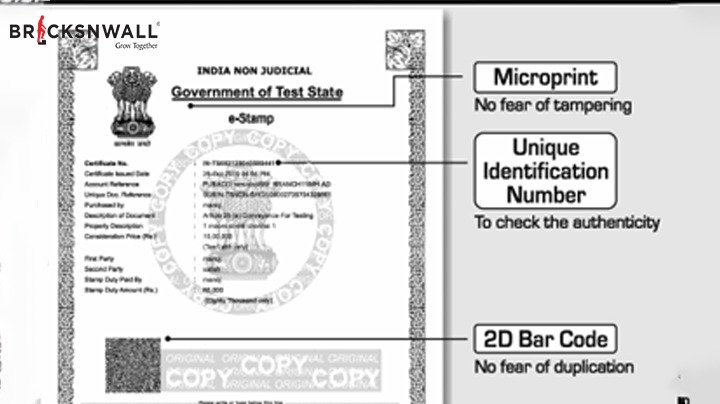An E-Stamp: What is it?
Bricksnwall Trusted Experts

An electronic stamp is created when the complete stamp paper purchase
procedure takes place online and no actual stamp paper is needed.
India's E-stamping
In an attempt to lower the number of errors and counterfeits, the Indian
government implemented the e-stamping service starting in July 2013. For all
e-stamps used in the nation, the Central Record-Keeping Agency (CRA) is the
Stock Holding Corporation of India Limited (SHCIL). The SHCIL is licensed to
handle everything from user registration and administration to e-stamping
applications and record maintenance. Additionally, it has authorised collecting
centres, or ACCs (scheduled banks), which provide certificates to those who
request them.
E-stamping advantages
The e-stamp certificate can be generated quickly with e-stamping.
The e-stamp certificate has a unique identifying number (UIN) and is
unchangeable.
It is possible to confirm the authenticity of the e-stamp certificate by
using the inquiry module.
A particular denomination is not required for e-etamping.
What is the function of SHCIL?
India's top depository operator, Stock Holding Corporation of India
Ltd. (SHCIL), was established as a public limited company in 1986.
SHCIL is a subsidiary of IFCI Limited, which, as of March 31, 2019, is
owned and promoted by all Indian banks and financial institutions, including
IFCI Ltd, LIC, SU-UTI, GIC, NIA, NIC, UIC, and TOICL. IFCI Limited also
maintained a 52.86% share in the company.
SHCIL is credited with "pioneering the Demat services in
India" and e-stamping services, which have simplified government payments.
It also serves as the main organisation for e-stamping record-keeping.
Clients of SHCIL include IDBI MF, LIC MF, GIC MF, SBI MF, Shriram MF,
Sundaram MF, Oriental Insurance, New India Assurance, National Insurance, and
United Insurance. SHCIL is one of the pioneers in the depository services
industry, with more than 6,50,000 accounts under management.
SHCIL electronic certification
The only central record-keeping agency (CRA) that the Indian government
has selected is SHCIL. The management of imprest balances, user registration,
and general e-Stamping application operations and maintenance fall under the
purview of the central record-keeping agency.
Citizens can print e-stamp certificates and pay stamp duty online from
the comfort of their homes by using the SHCIL e-stamping services.
Additionally, Authorised Collection Centres (ACCs) are appointed by SHCIL, and
at their counters, ACCs provide certificates to clients.
There are various ways to pay stamp duty in the electronic stamping
system
The client has the following options for paying the stamp duty amount:
Cash
Check
Demand Draft
Payment Order
RTGS
NEFT
Transfer from one account to another
How can you e-stamp your documents?
First step: Check out the SHCIL's official website at
https://www.stockholding.com/. After selecting "e-Stamp services,"
click on "products and services," and then pick
"e-Stamping."
It will be indicated on the webpage if e-stamping is permitted in your
state. As of right now, the NCT Delhi, Gujarat, Chhattisgarh, Karnataka,
Himachal Pradesh, Odisha, Tripura, Ladakh, Chandigarh, Jammu & Kashmir,
Puducherry, and Andaman & Nicobar Islands can generate an e-stamp
certificate online. The SHCIL has emphasised that residents should utilise the
facility wherever it is available in light of the COVID-19 pandemic.
Step 2: From the drop-down list, choose the state. We have chosen the NCT
of Delhi in the example.
Step 3: You must complete an application. Navigate to the "Downloads"
tab on the webpage and choose the necessary application. Assume that the
application in question is the one for which the stamp duty payment is under Rs
501. Just fill out the form after downloading it.
Step 4: In order to receive the stamp certificate, you must send this form
and payment.
List of states with e-stamping facility
- Andaman
and Nicobar Islands
- Andhra
Pradesh
- Assam
- Bihar
- Chhattisgarh
- Chandigarh
- Dadra
and Nagar Haveli
- Daman
and Diu
- Delhi
- Gujarat
- Himachal
Pradesh
- Jammu
and Kashmir
- Jharkhand
- Karnataka
- Odisha
- Puducherry
- Punjab
- Rajasthan
- Tamil
Nadu
- Tripura
- Uttar
Pradesh
- Uttarakhand
How can I pay the electronic stamping stamp duty?
Cash, checks, demand drafts, pay orders, RTGS, NEFT, and even
account-to-account transfers are all acceptable methods of payment for stamp
duty. You can pay with cash, a cheque or a debit card at an ACC.
What distinguishes franking from electronic stamping?
When you purchase a property, your state may charge you stamp duty.
Stamping property documents, on the other hand, is known as franking.
Authorized banks will use franking to stamp your document or apply a
denomination, which serves as evidence that the transaction's stamp duty has
been paid.
Related Searches
Click Here to Know about - An Overview of Property vs. Real Estate Taxes




